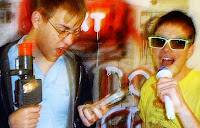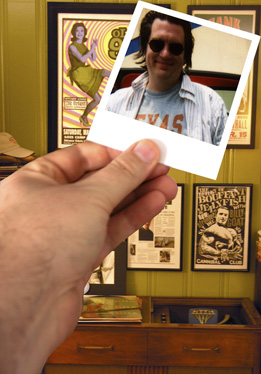 Rick Poss possesses a natural sort of cool that many people try to cultivate but few achieve. In Austin music circles, he's known for his incredible guitar prowess that he has displayed with the likes of Alejandro Escovedo, Jimmy LaFave, Jack Saunders, Jim Lauderdale, Greg Trooper, and Bruce Robison, among others.
Rick Poss possesses a natural sort of cool that many people try to cultivate but few achieve. In Austin music circles, he's known for his incredible guitar prowess that he has displayed with the likes of Alejandro Escovedo, Jimmy LaFave, Jack Saunders, Jim Lauderdale, Greg Trooper, and Bruce Robison, among others.
But what I've always thought made Rick a cool cat was not his unbelievable guitar playing ability, but rather his graciousness, his wit, his easy manner and his knowledge of all things pop cultural. The man is truly charming in a way that few possess. I've been fortunate enough to call Rick a friend for many years. He was my boss back in my Sound Warehouse days in Austin and I still remember him ribbing me when I bought a stack of Miles Davis and Thelonious Monk CDs in an effort to further my jazz education. "Oh," he said with that wicked Rick grin, "You think you like jazz!"
Rick, of course, knows jazz. And blues. And rock. And film noir. And baseball. I could go on, but let me just say that I always found Rick to be conversant on just about any subject -- and not in a show-off, look-at-me kind of way. Whenever I talk to Rick, I always leave thinking the same thing -- what a great conversation. And what a great guy.
So in case you haven't guessed, I think Rick kicks ass. That's why I am excited about his first-ever solo CD, The Dying Man, which you can buy from Waterloo Records in Austin, starting July 17. So now that Rick is stepping out of the shadows and into the spotlight, I thought maybe we needed to talk a little and share our conversation.
The Caravan of Dreams: Why did you decide now was the time for the solo CD?
Rick Poss: I had some time between projects and had been writing a lot of material that I couldn't use as a side man. After the death of my father in 2001 I had a nagging thought that I needed to leave something of my own behind. I guess it was just the combination of things, the time, the songs, the feeling.
TCoD: Where did the title come from?
RP: The Dying Man is a tribute both to the late John Fahey and my father. Fahey passed away while I was recording the record. He had done loads of work about death and dying, the blues and spiritual issues and since my father was a preacher there was a vague connection to me, a sort of tie in between the two passings. I also feel that songs are often about relationships and with the passing of a relationship can come the feeling of death or ultimate loss.
TCoD: I know your love of noir fiction and film noir was a huge influence on the CD. How did you incorporate that into the lyrics and sound of the record?
RP: I think that blues and detective stories have the man against the world in common. A man in search of truth or in search of honor is a common theme in both. The cover art as well has to do with a sort of noir quality. I often write songs from the title first. Titles like "No Answer," "Double Cross," "Lucky 7" are all movie titles. The sound I was going for in "Double Cross" particularly was like a jazz singer, maybe Chet Baker, that could be easily found in a noir sound track.
TCoD: What kind of a reaction are you getting from people who have only known you as the guy who plays guitar? People actually get to hear you sing!
RP: Many people have heard me sing in other bands, bits and pieces along the way. I have fronted bands since I started playing. Strangely, there are those who remember me more that way. I guess a few folks, when they heard I was making a CD, asked if it was all instrumental... I got a kick out of that!
TCoD: My favorite song on the album is "Apologies Don't Come Easy." It's just kind of a straight-ahead rocker. Can you talk a little about how that song came together?
RP: The sound of the song, the delivery, is somewhat like my music in the 80's. The subject or the character in the song needed to be a guy with an attitude. I've known plenty of people like that, as we all have. I think it's hard for most of us to apologize, even if we need to.
TCoD: I've always thought of Jimmy LaFave's Buffalo Return to the Plains as kind of minor Texas classic. What are your memories of that recording session?
RP: Minor? Really, I have Jimmy to thank for giving me so much space on the record. I'm all over it. He was very generous. The basics were a struggle. The drummer was new, the keyboard was new, and so was I, so it took us a while to gel. After a couple of days in the studio, I think we really came together and began to work as a unit. That's really magic when that happens. I agree that it's a great record and probably at the time the best work I had ever done.
TCoD: You also played on Alejandro Escovedo's Gravity. A lot of famous names on that one: Turner Stephen Bruton, Lou Ann Barton, Bruce and Charlie Robison. What are your memories of recording that album?
RP: Alejandro is such a great storyteller. It was easy! The ablum was quite different from our live performances from the period so then it took a while to come together. Oddly, most of the people you mentioned were not in the studio at the same time. Years later when I played with Bruce, I joked that we were on the same record and he didn't realize what I meant.
TCoD: You studied guitar with Paul Buskirk and Chris Florey (Benny Goodman)? What are the lessons that lasted from your time studying with them?
RP: Paul was a genius, who could play anything. He co-wrote "Night Life" with Willie Nelson and played anything with strings on it! Chris was a great sing player who showed me lots of chords and how to use them in a very different way than I had ever thought possible. The chords in "Double Cross" would not have happened without Chris showing me jazz inversions. I was lucky to run into them both when I did. The right instruction at the right time can make all the difference.
TCoD: I know that you are quite a record collector? What are a couple of records that have most influenced your development as a guitarist?
RP: The Blues Breakers record with Eric Clapton, Texas Blues by Lightin' Hopkins, all the Robert Johnson stuff, and A Man and His Blues by Buddy Guy ... Really there is so much it's hard to choose!
TCoD: Tell me again, WHY are you a New York Yankees fan?!
RP: Two words: Roger Maris.
TCoD: One of things I remember about you is you are quite a student of the JFK Assassination? Are you a conspiracy guy or a Lee Harvey Oswald guy?
RP: You know the answer to that! Seriously, I've always felt Jack Ruby should be considered the central character of that drama. When you think of it that way, it changes everything.
Thanks, Rick! Hope to see you in Cowtown soon.
 Yeah, I'm a big college football nerd. Here I am with my daughter and our good friend, Mack Brown, at Joe T. Garcia's on Monday night at the Longhorn Foundation shindig. He signed my Mack Brown Wheaties box. And my Rose Bowl ticket. And my Big 12 Championship game ticket. And my daughter's hat. He's just a good sport that way.
Yeah, I'm a big college football nerd. Here I am with my daughter and our good friend, Mack Brown, at Joe T. Garcia's on Monday night at the Longhorn Foundation shindig. He signed my Mack Brown Wheaties box. And my Rose Bowl ticket. And my Big 12 Championship game ticket. And my daughter's hat. He's just a good sport that way.






























